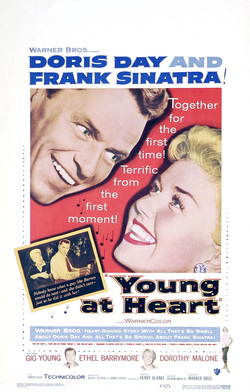 TCM Schedule http://www.dorisdaymagic.com/young-at-heart.html Young at Heart 1954 The only film ever to star Doris with Frank Sinatra. At the time, they were the world’s most popular singers, and they didn’t even sing any complete songs together! The soundtrack album only reached #15 because Sinatra had his own version (on a different label). When song-writer Alex Burke (Gig Young) enters the lives of the musical Tuttle family, each of the three daughters falls for him. The family lives in the fictional town of Strafford, Connecticut. Alex's personality is a match for Laurie Tuttle (Doris Day), as both she and Alex are seemingly made for each other. Her two sisters, although seeing other men, are infatuated with him as well. Soon Laurie and Alex are engaged, but when a friend of Alex's, Barney Sloan (Frank Sinatra), comes to the Tuttle home to help with some musical arrangements, complications arise. His bleak outlook on life couldn't be any more contradictory to that of Alex's, but Laurie is infatuated with him. That infatuation leads her to run off with Barney on what was supposed to be her wedding day to Alex. Meanwhile, Laurie's two other sisters, Fran (Dorothy Malone), and Amy (Elizabeth Fraser) each marry, despite still having feelings for Alex. Barney, with a black cloud perpetually hanging over his head, decides one evening to kill himself, feeling Laurie would be better off with Alex, as he would be a better provider. Barney drives into oncoming traffic during a snowstorm with his windshield wipers off. But he lives, and with a new found affirmation of life, and he finally writes the song he had been working on, finding his self-esteem in the arms of Laurie. The character of the self-destructive Barney Sloan was originally written to die at the end of the film when Sloan drives into on-coming traffic during a snow-storm. Sinatra, whose characters in his two previous films From Here to Eternity (1953) and Suddenly (1954), filmed before but released after Young at Heart perished at the end, thought Sloan should live and find happiness. Sinatra's growing influence in Hollywood was enough to have the ending re-written to accommodate his wishes thus creating a corny instead of a believable ending. Happy endings triumph once again.
0 Comments
Leave a Reply. |
Archives
February 2018
Categories
All
|
- Home
- Magic Blog
-
Remembering Doris
- Sentimental Journey Personal Tributes to the Magic of Doris Day
- Doris Day was more complicated, and more forward-thinking, than she ever got credit for
- Lifelong friend, business partner remembers Hollywood legend Doris Day
- Doris Day, America's box-office sweetheart of the '50s and '60s, is dead at 97
- Legendary actress and singer Doris Day has died
- How Doris Day’s Movie Roles Challenged Stereotypes
- Doris Day 'Died Peacefully' Surrounded by Her 'Loved Ones,' Says Manager
- Secret love’s no secret anymore
- The Matchless Presence of Doris Day
- Doris Day's death mourned in Carmel, where icon lived
- Remembering Doris Day
- Dream a little dream of Doris Day
- Inside Doris Day's Final Birthday Party at Her Home Near Carmel-by-the-Sea: 'It Was Idyllic'
- Hollywood Pays Tribute to Doris Day
- Doris Day, Cincinnati's girl next door, dead at 97
- RIP Doris Day
- R.I.P. Doris Day Decades
- TCM Remembers Doris Day
- Doris Day mourned by celebrities following her death: 'She was the world’s sweetheart'
- Pine Cone Tribute
- Doris Day rejected Lifetime Achievement Award about six times
- Hollywood Remembers Doris Day: Paul McCartney, Tony Bennett, Goldie Hawn Sing Icon’s PraisesPage
- Paul McCartney Remembers Doris Day: ‘She Was a True Star’
- Doris Day Appreciation: Why Did Oscar Elude A Shining Star Of So Many Talents?Link Page
- Paul Batura: Doris Day’s life was more than ‘Que Sera, Sera’ -- Because our ultimate future is ours to see
- A Hip Sex Goddess Disguised as the Girl Next Doore
- In Memoriam
- Happy Birthday Doris!
-
Tributes to an American Icon
- A Tribute
- Beneath wholesome image, Doris Day was an actor of depth
- Doris Day Changed Us Forever
- Why Doris Day reigns as one of the great jazz singers
- Lucky Me
- 60th Anniversary of “It Happened to Jane”
- A Letter to an American Icon
- What Singers Can Learn from Doris Day
- Meeting My Idol
- Doris Paved the Way for Women through Her Roles
- Uptown Pluck
- Reel Revival Doris Day
- Not the Girl Next Door: Doris Day Reconsidered
- Blonde and Blameless: Why I Love Doris Day Movies
- A Tribute to Alma Sophia Welz Kappelhoff Day
- Celebrity Memories
- No More Que Será Será: Give Day Her Due
- Doris Day Photo Gallery
- Doris and Pets (It's Her Passion)
- Magic Store
- Music - Early Years
-
Movies
- Doris Day Co-Stars
- Romance on the High Seas
- My Dream Is Yours
- It's a Great Feeling
- Young Man with a Horn
- Tea for Two
- The West Point Story
- Storm Warning
- Lullaby of Broadway
- On Moonlight Bay
- I'll See You in My Dreams
- Starlift
- The Winning Team
- April in Paris
- By the Light of the Silvery Moon
- Calamity Jane
- Lucky Me
- Young at Heart
- Love Me or Leave Me
- The Man Who Knew Too Much
- Julie
- The Pajama Game
- Teacher's Pet
- The Tunnel of Love
- It Happened to Jane
- Pillow Talk
- Please Don't Eat the Daisies
- Midnight Lace
- Lover Come Back
- That Touch of Mink
- Billy Rose's Jumbo
- The Thrill of It All
- Move Over Darling
- Send Me No Flowers
- Do Not Disturb
- The Glass Bottom Boat
- The Ballad of Josie
- Caprice
- Where Were You When the Lights Went Out
- With Six You Get Eggroll
- Top 20 Girls Next Door in Movies
- Press Books
- Movie Memorabilia
- Radio
- Television
- Interviews, Appearances on TV and Radio
- Latest News
- Awards
- Doris Day Fashion
- Doris in Carmel
- Doris through the Years
- Quotes by and about Doris
- Doris Talks to Her Fans (Fan Club Tapes)
- Who Knows What Might Have Been
- Creative Video Collection
- Doris Day Collector
- And a few rounds of applause...
- Contact Us
This entire website is copyrighted by www.dorisdaymagic.com. Certain rights reserved. All music fully licensed through Spotify, Radionomy, ASCAP, BMI and SESAC. This site is a participant in the Amazon Services LLC program, an affiliate advertising program designed to provide means for sites to earn advertising fees by advertising and linking to Amazon.com.
|
Find us on Facebook at https://www.facebook.com/groups/446019652829932
|
Email us at [email protected]
|
Find us on Instagram at www.instagram.com/dorisdaymagic100
|
 RSS Feed
RSS Feed

